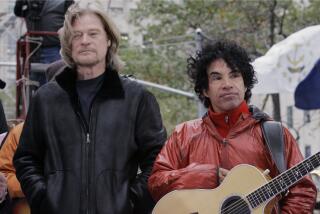Record U.S. Action Against Keating Begins : Thrifts: The proceeding against the former Lincoln Savings owner and six ex-associates seeks to bar them from the S&L; business and recover $130.5 million.
- Share via
LOS ANGELES — Despite arguments that the proceeding was unnecessary, a hearing on the largest enforcement action ever brought by federal thrift regulators began Monday against former Lincoln Savings & Loan owner Charles H. Keating Jr. and six former associates.
The hearing, presided over by Administrative Law Judge Paul J. Clerman, will determine whether Keating and the others must repay the government $130.5 million lost by Lincoln on four deals and whether they should be permanently barred from the thrift business.
Stephen C. Neal, Keating’s lawyer, argued that there was no reason for the Office of Thrift Supervision to waste taxpayer money on the proceeding since his client and the others would agree not to work in the S&L; business in the future.
And, he said, the restitution the OTS is seeking from the Keating group pales in comparison to the $2.7 billion sought by another regulatory agency on the same and other allegations. Besides, he said the restitution issue is moot since Keating is broke.
OTS lawyers insisted that the hearing go forward, despite other requests to delay the hearing. “We have an independent basis for proceeding, and that’s what we’re doing,” said Carol Lieberman, the OTS senior deputy chief counsel.
“As the record develops, it will speak for itself,” said Paul Leiman, an OTS senior attorney.
J. Lawrence Irving, a former federal judge, sought a delay while he attempts to reach settlements in the massive civil litigation stemming from the April, 1989, collapse of Lincoln and its parent company, American Continental Corp. The judge said a settlement could give the OTS what it wants most--a lifetime industry ban on Keating and others.
The U.S. Department of Justice also sought a delay, fearing that secret information given to two grand juries investigating Lincoln’s failure for the past two years would leak out before criminal indictments are issued.
The collapse of Lincoln is the costliest thrift failure to date with an expected taxpayer bill of $2.6 billion. The thrift’s demise was linked to risky real estate loans and projects, junk bonds and what regulators allege was insider fraud.
The Lincoln scandal has spawned several dozen civil lawsuits, including a fraud and racketeering suit brought by the Resolution Trust Corp., the federal agency that manages and liquidates failed thrifts. Keating and three others also were indicted on state securities fraud and are targets of at least one federal grand jury investigation.
Neal and Abbe David Lowell, attorney for former American Continental President Judy J. Wischer, also cited the criminal case and federal probe as reasons to delay the OTS hearing. The lawyers said that they face time constraints in preparing for the state’s criminal case and that their clients may be forced to invoke their Fifth Amendment privilege against self-incrimination when the OTS hearing resumes tomorrow at the Los Angeles County Superior Court.
Besides Keating and Wischer, the other respondents are former American Continental executives Robert J. Kielty and Andre A. Niebling; Keating’s son, Charles H. Keating III, and two Keating sons-in-law, Robert J. Hubbard Jr. and Robert M. Wurzelbacher Jr.
Even Clerman seemed amazed at the legal might arrayed against Keating and his former colleagues. But after he heard a half-day of arguments, he decided to start taking testimony.
The first two witnesses testified about American Continental’s employee stock option plan.
Regulators charge that Lincoln lost $12.3 million by improperly funding a stock option plan at Phoenix-based American Continental. The OTS contends that Keating, his family and top executives enriched themselves by selling stock to the plan.
More to Read
Inside the business of entertainment
The Wide Shot brings you news, analysis and insights on everything from streaming wars to production — and what it all means for the future.
You may occasionally receive promotional content from the Los Angeles Times.








